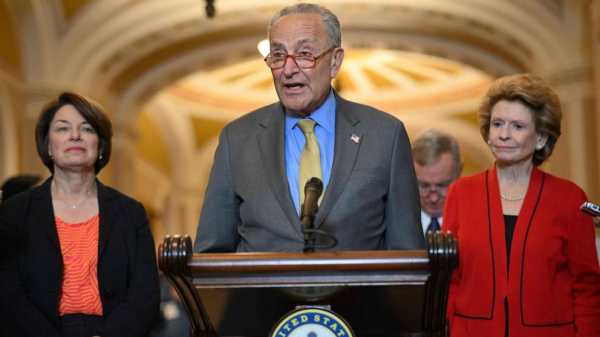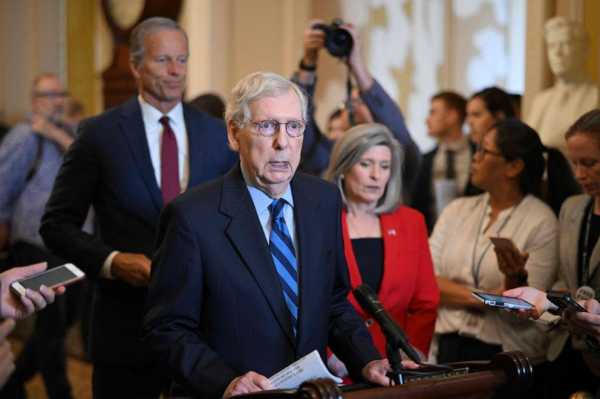With just days until a June 5 deadline, the Senate now is racing against time to pass the debt ceiling bill and avoid what would be an economically catastrophic default.
But while Majority Leader Chuck Schumer said work would begin immediately after House passage Wednesday night, it's rare for anything to get resolved quickly in the United States Senate.
"We're getting close to putting this threat of default behind us," Schumer, D-N.Y., said on Wednesday. "But there's still more work, perhaps the most important work, to do: passing it into law."
No room for typical Senate delay
As the drama plays out, there is almost no room for delay if the bill is to get to President Joe Biden's desk by Monday, the day Treasury Secretary Janet Yellen warned the U.S. could run out of money to be able to pay all its bills on time and in full.
MORE: Will the debt ceiling deal actually increase SNAP food stamp eligibility, cost?

Senate Majority Leader Chuck Schumer speaks during a news conference following Senate Democrat policy luncheons in Washington, May 31, 2023.Mandel Ngan/AFP via Getty Images
The current goal, aides on both sides of the aisle say, is to pass the measure by late Friday.
In addition to the deadline, it could help that that's also supposed to be the start of a three-day weekend for senators — and getting out of Washington is a time-honored motivator for faster action.
Schumer: No changes, 'plain and simple'
Threatening to hold up the process, though, is a possible filibuster or time-consuming debate and votes on amendments being sought by various lawmakers, mainly Republicans, but some Democrats, too.
Senators normally are accorded great deference and time to have their say, but when asked Wednesday how many amendment votes he'd allow, Schumer punted. He emphasized the bill can't be changed or else it would need to go back to the House for review.
"We are going to do everything we can to move the bill quickly," Schumer told ABC News. "We cannot send anything back to the House. Plain and simple."
"We must avoid default, we must," he added.
Minority Leader Mitch McConnell, R-Ky., had a similar "time is of the essence" message for his own conference.
"I can tell you what I hope happens — is that those who have amendments, if given votes, will yield back time so that we can finish this Thursday or Friday and soothe the country and soothe the markets," McConnell said Wednesday.

Senate Minority Leader Mitch McConnell speaks during a news conference following Senate Republican policy luncheons in Washington, DC, May 31, 2023.Mandel Ngan/AFP via Getty Images
Senate GOP leaders see Friday night passage possible
Minority Whip John Thune, R-S.D,. told ABC News Wednesday that if Republicans get votes on roughly half a dozen amendments, even GOP opposition won't block swift passage of the deal.
When asked if that could be by Friday night, Thune agreed: "Yeah, I mean, I think it could happen fairly quickly if there's agreement. But we'll get a better sense of where our members are today."
MORE: Congress has days to OK debt limit deal before default: Timeline of what's next
Sen. Rand Paul, R-Ky., tweeted Wednesday he will "insist on an amendment vote" on his alternative debt ceiling plan that would lift the limit by $500 billion while cutting spending across the board by 5%, and Sen. Lindsey Graham, R-S.C., said he would try to bring up an amendment to increase the level of defense spending in the bill.
The current Biden-McCarthy deal only allows a 1% increase in defense next fiscal year, which accounting for inflation would amount to a cut.
"I think that's the worst part of the deal," McConnell said Wednesday. "The defense buildup — which we began in December — peters out and then it's only up slightly but more than domestic. So, I don't think it's as good as I would like, but if you look at the totality of the agreement, I think it should be supported and our defense needs will still be there."
Despite those concerns, there appears to be general agreement on the bottom line: that if the bill is changed by even a single letter, it would have to return to the House and at that point — both it and the country would face an uncertain fate.
Sourse: abcnews.go.com






